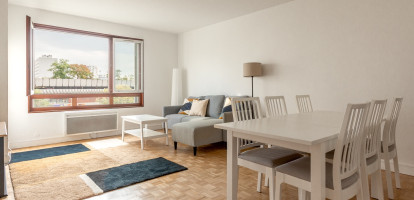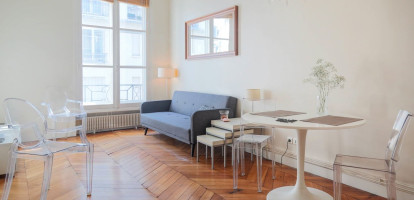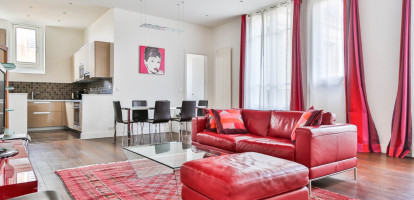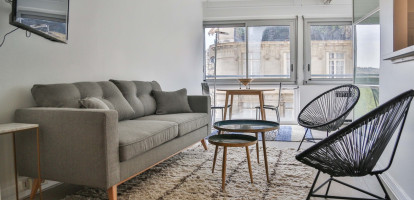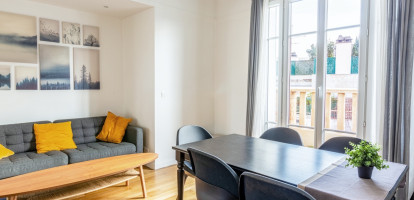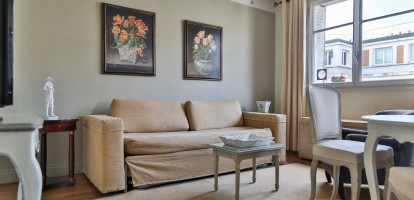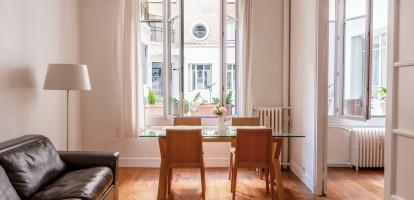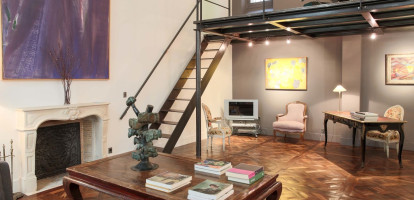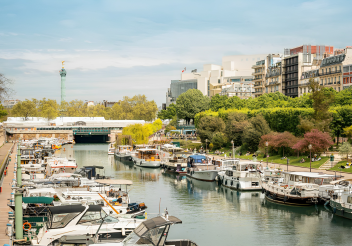Paris offers an outstanding healthcare system and excellent medical establishments, which are vital for expatriates living in France and are among the primary reasons why expats relocate to France. With access to national and private health insurance, expats in France can benefit from top-quality medical services provided by some of the best hospitals and private clinics at a very affordable price. However, navigating the French public and private healthcare system can be challenging for expats moving to Paris, especially those who do not speak fluent French, with language barriers, unfamiliar bureaucratic processes, and differing healthcare practices; here's our complete guide to the French healthcare system, top-up healthcare, medical expense reimbursement, expatriate-friendly Paris hospitals for expats, and more.
Explaining the French healthcare system
The French healthcare system is renowned for its comprehensive coverage and high-quality care. It comprises both national social security and private health insurance components (mutuelle).
Assurance Maladie (National Health Insurance):
Assurance Maladie, commonly called the French public health insurance, is France's primary healthcare scheme. It provides basic health coverage to residents, including French citizens and expatriates living and working in France for at least three months. However, all children in France are automatically covered by public health care, regardless of nationality.
The Assurance Maladie system has various agencies, including the National Health Insurance Fund (Caisse Nationale de l'Assurance Maladie or CNAM), regional health insurance funds (Caisse Primaire d'Assurance Maladie or CPAM), and affiliated organizations.

Coverage of French Public Healthcare System: Basic Healthcare Services:
The French public healthcare system offers comprehensive coverage, including consultations, hospitalizations, medications, and preventive care for all the residents in France. Social Security reimburses a portion of healthcare expenses, with the patient's supplementary insurance to cover remaining out-of-pocket costs and provide coverage for services not fully reimbursed by the Social Security system, such as specific dental treatment, optical services, and alternative medicine.
The percentage of reimbursement you receive from Social Security depends on the type of treatment you receive, the care passway you took, etc. It is generally 70% for treatment by general practitioners, dentists, midwives, and most specialists. Hospital stays in France are reimbursed at 80% by Social Security, and prescription drugs up to 100%, especially high-cost drugs. Refunds on vaccines go up to 65%, and even certain vaccines, such as COVID-19, are covered up to 100%. Public healthcare insurance covers eye care and hearing aids up to 60%.
Funding Mechanism of French Social Security System:
You must first join the French Social Security system, and complete the CPAM (Caisse Primaire d'Assurance Maladie) registration to benefit from French public healthcare. The system is primarily funded through social security contributions from employees, employers, and the self-employed, along with tax revenues and government subsidies. These contributions finance various social welfare programs, including healthcare, pensions, unemployment benefits, family allowances, and disability benefits.
Several factors influence the cost of social security contributions for healthcare, such as income level and household size. On average, it amounts to 7% to 13% of the total salary.

Affiliation Scheme of Social Security in France:
The affiliation scheme of the French Social Security system is a structured framework that determines who is covered by Social Security and how they contribute to and benefit from it. For expats living in France, their affiliation with the French Social Security system depends on various factors such as their nationality, employment status, and the duration of their stay, such as
EU/EEA/Swiss Nationals:
Expats coming from the European Union (EU), European Economic Area (EEA), and Swiss generally have access to healthcare services in France thanks to the European Health Insurance Card (EHIC) or the European Health Insurance Card Replacement Certificate (EHICRC). This European Health system enables European expats to receive necessary medical care during their temporary stay in France, with medical costs reimbursed by their home country's social security system.
Employed Expats in France:
Corporate expatriates working in Paris France for a French company or having an employment contract benefit from the French general Social Security system (régime général de la sécurité sociale).
Employers usually register their employees with Social Security and handle formalities on the employee's behalf. Employees' Social Security contributions are deducted from their salary, and their employer pays part of the contributions as well.
Self-Employed Expats in France:
In France, self-employed individuals also make social security contributions based on income. Therefore, self-employed expats in Paris or running their businesses in France are responsible for paying social security contributions.
Students (Étudiants):
Generally, students in France who have not reached 24 years old are covered by their parent's social security scheme.
Suppose you are an international student studying in France and not affiliated with any social security organization. Don't worry! You can apply for national universal health protection (Puma—protection universelle maladie), which covers all persons working or residing in France and guarantees the right to cover healthcare costs.
Simplifying Healthcare Access: Activating Your Ameli Account
After registering in the French healthcare system and getting your social security number, you should create an Ameli account to facilitate your future healthcare access and reimbursement process in France.
The Ameli account is a personal online platform provided by the French Health Insurance system (Assurance Maladie). It allows individuals to conveniently manage their healthcare-related tasks and information. Through the Ameli account, users can access various services such as checking reimbursement status, downloading essential documents like certificates of entitlement, ordering a Carte Vitale (French health insurance card) or the European Health Insurance Card, updating contact details and reimbursement addresses, and more.

Carte Vitale: Your Key to French Healthcare
Once you have activated your health insurance, you may need to request your carte vitale (french health insurance card) yourself. The Carte Vitale is a smart card issued to every individual covered by the French social security system. It contains essential personal and medical information and proves entitlement to healthcare services in France.
Patients must present their Carte Vitale when visiting doctors and hospitals and getting prescribed drugs at pharmacies. Carte Vitale simplifies billing processes, guarantees rapid reimbursement of medical expenses, and provides access to essential medical records.
How do you get your first Carte Vitale?
You can order your first carte vitale online from your Ameli account or by post from your local healthcare office (CPAM).
The Carte Vitale is issued free of charge by the Assurance Maladie. Pay attention that it might be a scam if someone asks you for money to issue you a Carte Vitale.

Reimbursement System of French Social Security:
When a patient receives medical treatment in France, the healthcare provider sends the bill directly to Social Security for reimbursement. Social Security typically reimburses a portion of the cost, with the remainder covered by the person's supplementary insurance or paid out of pocket by the patient.
Health Insurance reimbursement in France works via bank transfer, so it's crucial to provide and update your bank details (RIB—Relevé d'Identité Bancaire).
Reimbursement with a carte vitale:
You provide your Carte Vitale to the healthcare professional you're consulting during the healthcare session. Then, the professional enters various details into their computer, including your identifier, treatment date, and fee amounts. These details will be used to create the billing for your treatment and start the reimbursement process.
If you hold an Ameli account, you can get reimbursements directly into your bank account.
Reimbursement without a carte vitale:
If you don't hold a carte vitale yet, forget your Vitale card during your healthcare, or if the doctor doesn't have a computerized system, the doctor will give you a paper healthcare form called "Feuille de soins" for billing and reimbursement at the ending of the session. All you need to do is fill in the "Feuille de soins" and send it to your local health insurance office for reimbursement.

Supplementary Private Health Insurance (Mutuelle):
Many expatriates in France supplement their basic National Health Insurance with private health insurance, commonly known as "Mutuelle."
Mutuelle acts as extra healthcare coverage alongside the public social security system. While social security covers part of healthcare expenses, Mutuelle helps with remaining costs and additional services not fully covered by the public system, including dental care, vision care, prescription medications, alternative medicine treatments, and private hospital stays.
Private insurance companies offer mutuelles that individuals can purchase or provide as part of employment benefits packages. Employers in France offer a share of a mutuelle as a supplementary health insurance of their benefits package (at least 50% by law). Employees can share their mutuelle with their kids or partners by paying a little extra.
Mutuelle often offers benefits like direct billing with healthcare providers. By presenting your social security card (carte vitale) and Mutuelle certificate (carte de tiers payant) after a doctor's visit or when you get a medication prescription at the pharmacy, you may not have to pay anything or only a tiny amount.

Mutuelle certificate (carte de tiers payant)
How much does a complementary health insurance plan cost on average in France?
The mutuelle plan price varies depending on several factors, such as the insured's age, place of residence, employment status, and the policy's cover.
| Age of the insured |
Average monthly cost of Mutuelle (private health insurance) |
| 18-25 years old |
42 € per month |
| 25-54 years old |
77 € per month |
| 55-64 years old |
234 € per month |
| 65-75 years old |
252 € per month |
| Over 75 years old |
173 € per month |
Great health insurances in France for expatriates
Some of the great health insurance (mutuelle) for expats in France are:
- Cigna Global
- Allianz Care
- AXA PPP International
- Bupa Global
- Carps
- April International
Choosing the right hospital in Paris as expats
When choosing a hospital in Paris, several factors should be considered, including specializations, quality of care, accessibility, and services for international patients. Here's a list of renowned Parisian hospitals known for their excellence in various fields, mainly catering to expats:
American Hospital of Paris (Hôpital Américain de Paris):
The American Hospital of Paris, located in Neuilly-sur-Seine, just outside the vibrant city of Paris, is one of the most popular medical options for expats in Paris. Established in 1906, the American Hospital caters primarily to the needs of healthcare for American expatriate in Paris. Over the years, it has evolved into a world-renowned hospital renowned for its commitment to providing exceptional medical care to patients from all around the globe.
Specializations: Offers various medical specialties, including cardiology, oncology, orthopedics, and obstetrics.
Services for International Patients:
- The hospital offers specialized services for international patients. Services may include:
- Language interpretation.
- Assistance with administrative procedures.
- Coordination of care.
- Support with accommodation arrangements.
- The hospital staff is accustomed to working with patients from various cultural backgrounds, ensuring a comfortable and seamless experience for international visitors.
Address: 55 Bd du Château, 92200 Neuilly-sur-Seine
Accessibility: Pont de Neuilly (Metro line 1), Pont de Levallois Bécon (Metro line 3)
Gustave Roussy:
Gustave Roussy is one of the world's leading cancer research and treatment centers specializing in oncology and hematology. Located in Villejuif, a nearby suburb of Paris, the Gustave Roussy Hospital was founded in 1926 and is renowned globally for its advanced treatments and research in cancer care. According to Newsweek, Gustave Roussy is the 4th world's best hospital in oncology.
Address: 114 Rue Edouard Vaillant, 94805 Villejuif
Accessibility: Accessibility: Villejuif Paul Vaillant-Couturier (Metro line 7)
Hôpital Européen Georges-Pompidou (HEGP):
Established in 2000, the public hospital Hôpital Européen Georges-Pompidou (HEGP) is one of Europe's leading medical institutions. Located in the 15th arrondissement of Paris, it is renowned for its multidisciplinary approach to patient care and its commitment to advancing medical science.
Specializations: cardiology, cardiovascular surgery, and organ transplantation.
Address: 20 Rue Leblanc, 75015 Paris
Accessibility: Balard (Metro line 8 and Tram T3a), Pont du Garigliano - Hôpital Européen Georges Pompidou (RER C)
French Pharmacy Guide
Pharmacies in France, marked by a neon green cross when they are open, are the only shops allowed to sell medications with prescriptions. They also sell over-the-counter (OTC) drugs and a wide variety of products, such as health and wellness products, baby products, veterinary products, pregnancy and maternity products, skincare and beauty products, personal care items, medical supplies and devices, dietary and weight management products, and others. Besides, some pharmacies in France offer specialized services like vaccinations, blood pressure checks, cholesterol tests, and diabetes screening.
In Paris, pharmacies are generally open from 8:30 a.m. to 7 p.m., Monday through Saturday. However, some pharmacies in the city are open late or even 24/7.
French pharmacists undergo rigorous training and education, including a minimum of six years of university study, which covers a broad range of medical and pharmaceutical knowledge. And a lot of them speak both French and English. If you have little emergencies or can not consult your general practitioner immediately, the pharmacists here can advise you on minor health problems like colds, allergies, and minor injuries; pharmacists provide recommendations for effective over-the-counter medications.
24/7 Pharmacies in Paris:
-
Pharmacie des Champs-Elysées: 84 Av. des Champs-Élysées, 75008 Paris
-
Pharmacie Européenne de la Place de Clichy: 6 Pl. de Clichy, 75009 Paris
-
Pharmacie de la Porte Maillot: 68 Av. de la Grande Armée, 75017 Paris
Emergency Health Care in Paris, France
Dialing Emergency Numbers in France:
In case of a medical emergency, expatriates can call
- 112 - the European emergency number, free of charge everywhere in the EU,
- 15 - the French national medical emergency number (SAMU).
- 18 - pompiers (firefighters) - French firefighters are well-trained in first aid and cardiopulmonary resuscitation and are usually the first to arrive at almost any emergency or accident scene.
Immediate Medical Treatment:
Hospital emergency departments in France provide immediate medical treatment regardless of insurance status or nationality.
Payment and Coverage:
Upon arrival at the hospital, patients needing urgent medical attention can arrange payment and insurance coverage later.

Specialized Medical Consultations in Paris
Registering with a General Practitioner (GP) in France
In France, expat residents are encouraged to select a "médecin traitant" (treating physician/family doctor), typically a general practitioner (GP) or specialist, to serve as their primary healthcare provider within the French healthcare system. Doctors in private practice are often found in apartment building, in clinics or private hospitals. To find a general practitioner speaks English and in your neighborhood, use the website of Doctolib, follow these steps:
- Visit Doctolib's Website: Go to Doctolib's homepage.
- Search for a General Practitioner: In the search bar at the top of the page, type "Médecin généraliste."
- Specify Your Location: In the location field next to the search bar, enter your precise location, be it a city, neighborhood, or postal code. Rest assured, our system will accurately locate the doctors near you.
- Filter for English-speaking doctors: After the search results appear, use the filters on the left side of the page. Under the "Languages spoken" section, select "English" (or "Anglais").
- Browse and Select a Practitioner: Look through the list of general practitioners who meet your criteria. You can see details about their practice, patient reviews, availability, tariffs, and contracts with the French social security system (Secteur 1, 2, or 3).
- Book an Appointment: Once you find a suitable general practitioner or specialist, you can book an appointment directly through the Doctolib platform by selecting an available time slot.
The Role of the Attending Physician:
The "médecin traitant" is the primary point of contact for all medical needs, overseeing and coordinating the patient's healthcare journey. Responsibilities include managing referrals to specialists, organizing diagnostic tests, facilitating hospital admissions, and overseeing vaccination schedules. You can change your GP (médecin traitant) if and when you feel it's necessary by simply submitting a new GP registration form from your account on the Ameli website. Your new "médecin traitant" can also make this declaration for you.
Benefits of Coordinated Healthcare Pathway:
Seeking medical care first through your designated GP (médecin traitant) enhances better reimbursement from the French national health insurance system, which facilitates the "Parcours de soins coordonnés" (coordinated care pathway), offering 70% coverage when consulting your GP first. Conversely, bypassing this pathway with a "médecin traitant" (treating physician) reduces reimbursement to 30% of the consultation cost.
Exceptions to GP Requirement:
Some specialists, such as ophthalmologists, psychiatrists, stomatologists, gynecologists, midwives, and dental surgeons, may be consulted directly without impacting reimbursement.
How to Register with a Primary Care Physician?
- Online Declaration: Register yourself online via "Mon espace santé."
- Doctor's Declaration: Your chosen doctor can make the declaration during a consultation using your "carte vitale," forwarding it directly to your health insurance fund.
- Postal Submission: Download, complete, and sign the "declaration of choice of preferred doctor" form with your selected doctor. Send the form via post to your local health insurance office.
Note: You can change your preferred doctor anytime without justification.
Obtaining a Medical Prescription:
If required, your treating physician will furnish a medical prescription (ordonnance) that you can pick up at any pharmacy or a referral for specialized consultations, facilitating direct appointments with specialists or hospital scheduling systems.
Getting prescribed medications in France:
Take the prescription to a pharmacy, where the pharmacist will provide the medication. If you have a carte vitale and a mutuelle certificate (additional private insurance), remember to give them to the pharmacist, who will automatically deduct the reimbursable portion from the price. In general, you receive medication for one month of treatment. For chronic conditions, you may receive long-term prescriptions, with which you can return to the pharmacy to obtain additional medication.
Getting X-rays and lab tests in France:
In France, if X-rays and lab tests are needed, your general practitioner (GP) or specialist will write you a prescription. Once you have the prescription, you can book an appointment at a radiology center or lab. You can ask your doctor or pharmacist to recommend a testing facility or find a nearby lab using applications like Doctolib. Many labs also accept walk-ins. When you book your appointment, check if there is anything you should or shouldn't do before the test (for example, eat or drink).
Costs are typically covered by Assurance Maladie, with a small co-payment that supplementary insurance (mutuelle) can cover. Results are usually sent directly to your doctor, with the option for you to receive a copy as well. In any emergency, you can go directly to the emergency room without a prescription, and necessary diagnostic tests will be provided. Always carry your Carte Vitale and any supplementary insurance information.
Children's healthcare in France: Vaccinations & Carnet de Santé
Vaccinations:
In France, children's healthcare, including vaccinations, is highly prioritized and systematically organized. The French vaccination schedule is comprehensive, with several vaccines mandated by law to ensure the health and safety of all children. Key vaccines include those against diphtheria, tetanus, pertussis, polio, Haemophilus influenzae type b (Hib), hepatitis B, pneumococcal infections, measles, mumps, rubella, and meningococcal C. These vaccinations are free of charge through the French national healthcare system, Assurance Maladie.
Expat parents are advised to bring their child's vaccination record from home and consult with their local general practitioner in France to catch up on any missed vaccinations and avoid duplicate shots. Be aware that if your child's vaccinations are not current, they may be refused access to group activities in France, including school and daycare centers (crèches).
In France, to get vaccinated, you need to schedule an appointment with a local general practitioner (GP) or a pediatrician or visit a local health clinic dedicated to maternal and child health (PMI center - Protection Maternelle et Infantile). Doctors will give you a prescription for the required vaccines. With the prescription, you can pick up your vaccines at the pharmacy. Once you've received the vaccine, you can return to your doctor or make an appointment with a nurse who will administer it. If your vaccines are not ready right away, typically, you will need to store them in refrigerators to maintain their effectiveness.
Carnet de Santé - Health booklet
In France, the "Carnet de Santé" (Health Booklet) is a crucial document for individuals, especially children, which is issued at the time of birth and records their health information throughout their lives. It serves as a comprehensive record of vaccinations, medical check-ups, growth milestones, and any illnesses or treatments received. If your child already has a health record in your home country, it will probably be accepted in France as long as you can provide a complete French translation. If your family intends to stay in France for a while, it might be more practical to ask your doctor for a new health record.
How much does a doctor charge in France?
When you visit a doctor, the consultation fee varies depending on whether the doctor is "conventionné." A "conventionné" doctor has signed an agreement to respect the rates set by the health insurance system (Assurance Maladie). They can be in either Sector 1 or Sector 2.
In Sector 1, "conventionné" doctors (general practitioners or specialists) have rates set by the agreement and do not charge extra fees.
In Sector 2 or 3, doctors are allowed to charge extra fees.
Medical Consultation fee for Doctors of Sector 1
The consultation fee with any Sector 1 doctor is €26.5.
The National Health Insurance reimburses 70% if the doctor is your primary care physician; therefore, the reimbursement is €17.55 since €1 is deducted for everyone.
However, if the doctor is not your general practitioner, reimbursement is 30%, excluding consultations with gynecologists, ophthalmologists, stomatologists, or psychiatrists/neuropsychiatrists for patients aged 16-25.
Medical Consultation Fee for Conventional Doctor of Sector 2
The reimbursement for consultations with a Sector 2 doctor varies based on whether they are Optam members.
Optam is an agreement between doctors and French health insurance, allowing doctors to charge limited extra fees.
Optam member Sector 2:
For medical consultations with Sector 2 doctors who are part of Optam, the French health insurance (Assurance Maladie) uses the same reimbursement rates as Sector 1 doctors.
Consultations with these doctors may exceed €26.5, but the reimbursement base remains fixed at €26.5. So, regardless of the consultation fee, you'll receive a reimbursement of €17.55 from the French Social Security.
Example:
For instance, if the consultation costs €30, you'll still only receive a reimbursement of €17.55 (based on the €26.5 rate). You or your supplementary health insurance must cover the remaining €12.45.
Non Optam member Sector 2:
Doctors outside Optam can set prices and add extra fees as they see fit. The Assurance Maladie reimburses the cost of consultations and procedures based on the rates applicable to Sector 2 doctors.
A consultation with a Sector 2 doctor not affiliated with Optam (whether they're a general practitioner or a specialist) might cost more than €26.5. However, health insurance reimbursement stays based on a fixed rate of €23. So, regardless of how much you paid for the consultation—whether it's €26.5, €30, or even €50—you'll receive a reimbursement of €15.10.
Medical Consultation Fee for Non-Conventional Doctors of Sector 3
Sector 3 doctors operate outside the medical convention, setting their fees freely.
You'll receive a fixed reimbursement of €0.61 for consultations with a general practitioner. For specialist consultations, the reimbursement is €1.22.
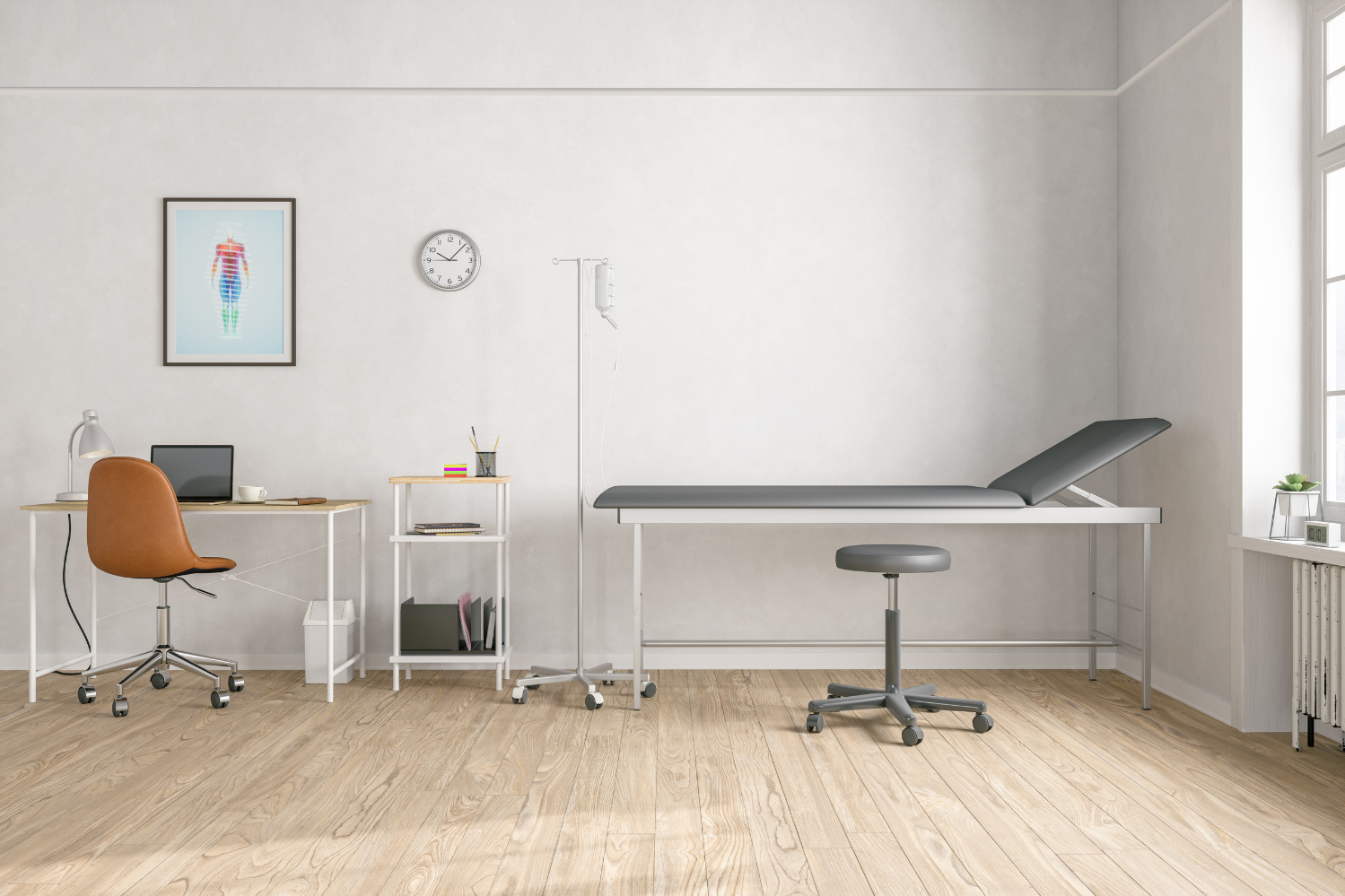
How do you overcome language and communication barriers to healthcare in France?
Professional Interpreters: Healthcare facilities may provide professional interpreters or language services to assist patients who need to speak French fluently and facilitate communication between healthcare providers and patients.
Filtering doctors and healthcare practitioners based on their languages with online platforms like Doctolib: How do you find English-speaking doctors in Paris? Doctolib is an excellent tool. Doctolib is a popular online platform for booking medical appointments with doctors, specialists, and other healthcare practitioners (e.g., nurses, lab technicians, midwives, physiotherapists, psychologists). It provides patients a convenient way to search for healthcare providers, view their availability, and schedule appointments online. Besides, the application of Doctolib also allows you to filter doctors based on their languages, enabling patients to find healthcare professionals who can communicate with them effectively in their preferred language. You will be surprised to find that many doctors speak English in Paris.

Translation Services: Written materials such as forms, instructions, and medical documents can be scanned and translated into multiple languages thanks to intelligent translation apps or websites such as Google Traduction or Reverso. During healthcare sessions, you can also use the Voice Translate application, such as DeepL or Google Traduction, to instantly translate voice dialogue.
Community Resources: Patients can access community organizations or support groups that provide language assistance. These resources can offer additional support and guidance when navigating the healthcare system.
Hospitalization experience in France
Admission to a hospital:
Hospitalization in France typically begins with admission to a hospital, which can occur through various channels, such as emergency departments, outpatient clinics, or scheduled admissions. The different types of hospital stay in France:
Entire hospitalization means that the patient spends at least one night in a hospital bed. Sometimes, the patient stays alone in a room; more frequently, the patient shares a hospital room with other patients.
With part-time hospitalization, the patient receives hospital care for a single day or night, a few hours, or in several sequences. Partial hospitalization includes examinations, medical monitoring, or rehabilitation. For example, in the case of outpatient surgery, the patient is admitted, treated, and discharged in a single day.
Choosing your hospital:
Apart from emergencies, you can be treated in the hospital of your choice, whether public or private.
It would help to ask about the fees and the reimbursement amounts of Social Security and your complementary health insurance in advance, as some hospital establishments, including certain private establishments, charge extra costs that the Assurance Maladie does not cover.
How to get ready for your hospital stay in France?
Before you go to the hospital:
- Make sure you have all your paperwork ready. You'll need to hand this in at the reception when you arrive.
- Bring your ID card with a copy of it and your valid health insurance card, known as "carte vitale," or any proof of your health insurance membership.
- If you have additional health insurance, remember to bring that card too.
It's essential to bring the file you received after your pre-anesthesia consultation. Ensure you have your medical records with all the necessary documents, like X-rays, prescriptions, and lab test results.
Remember to pack your toiletries and, if needed, a change of clothes. Consider bringing along some reading material or music to make your stay more pleasant. Regardless, don't eat, drink, or smoke for six hours before the operation. Use the antiseptic product provided during your shower on the morning of the operation.
Planning Your Hospital Discharge: What You Need to Know
Discharge Voucher and Documentation
When leaving the hospital, you'll receive a discharge voucher. Send this to your health insurance provider and employer promptly to access benefits. Keep a copy of the voucher and other hospital documents handy, especially if a transfer to another medical facility may be necessary.
Assistance with Daily Tasks after Hospital Discharge
If your health condition warrants it, you may qualify for assistance with daily tasks like cooking and household chores. Consult your doctor to determine eligibility for this support.
Home Care Options after Hospitalization
Individuals over 60 or with specific medical needs may be eligible for medical and paramedical care at home. Regardless of age, adequate rest after hospitalization is essential for recovery.
Communication with Healthcare Providers about Your Post-Discharge Plans
If you have any concerns or questions about post-discharge plans, discuss them with your attending physician. Ensuring clarity and understanding regarding your next steps in the recovery process is crucial.
To recap, expatriates in Paris can easily access good healthcare thanks to the French national health insurance scheme (Assurance Maladie) and supplementary insurance. Facilities such as Ameli accounts and Carte Vitale, expatriate-friendly hospitals, and multilingual doctors help to simplify the process.
Editor: Siyi Chen
Photo credit @ Unsplash+
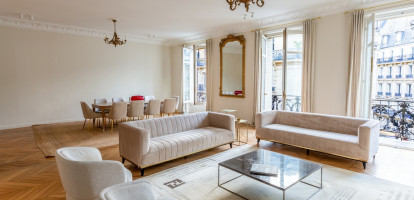


 Français
Français










